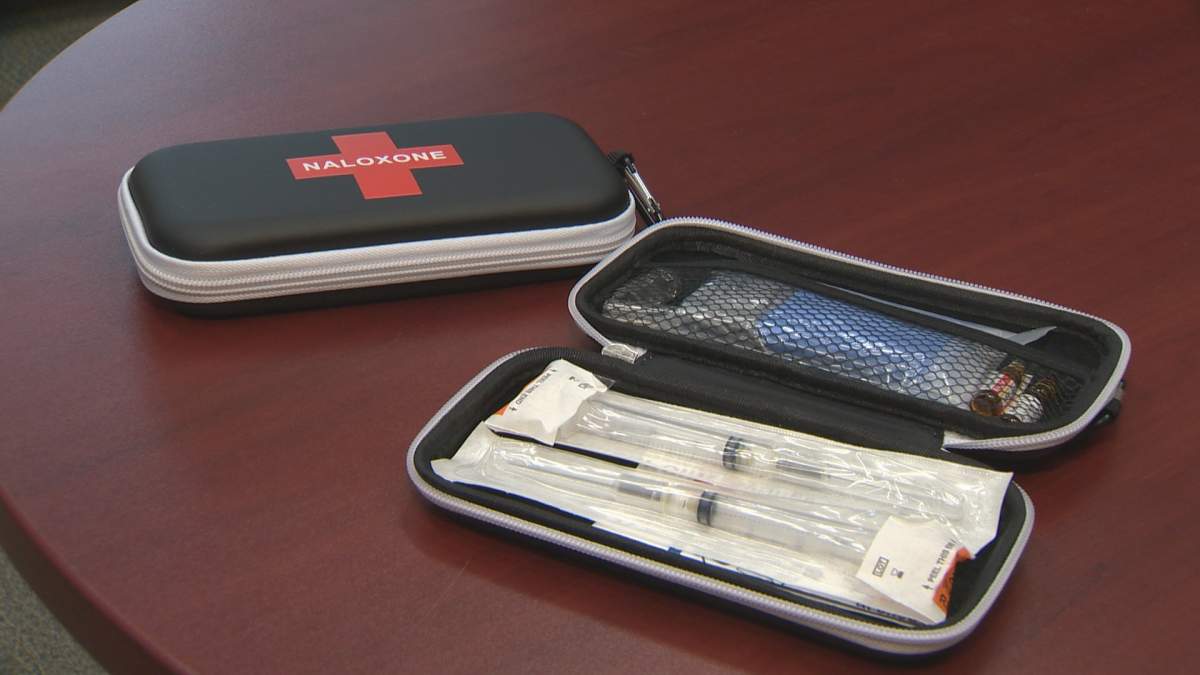In the just over 13 weeks since Edmonton Fire Rescue have been equipped with naloxone kits, firefighters have used them nearly three times a week treat people suspected of overdosing on opioids like fentanyl.

READ MORE: Fentanyl 101 – The facts and dangers
The life-saving kits have been used 36 times between the end of February and Friday morning, according to Edmonton Fire Rescue. Firefighters have not had to use any of the kits on themselves. Edmonton crews have treated fewer overdoses than their Calgary counterparts, who after six weeks had used the kits 45 times.
A spokesperson for the Edmonton Police Service said its officers have not yet had to use naloxone but said it is tracking its use and would “fully review the incident” when it is used.
READ MORE: Calgary firefighters use naloxone kits 45 times in 6 weeks
Calgary firefighters began carrying the kits in December 2016, and a few months later in February the provincial government began providing injectable naloxone kits and training to Alberta first responders at no cost.
More than 113 people died of apparent fentanyl overdoses in Alberta in the first three months of 2017. Alberta Health said 91 per cent of the deaths so far this year occurred in larger cities, with 51 deaths in the Calgary area and 36 in the Edmonton region.
“There’s a false sense of security,” Block said. “People think it’s only an inner-city problem. Yes, because of the density in the inner city, there’s a good number of events downtown… but I can tell you that there are (overdoses) in every neighbourhood of the city of Edmonton.

Get weekly health news
“No one is immune to this issue.”
READ MORE: 113 fentanyl-related deaths in Alberta in first 3 months of 2017
A City of Edmonton report released Thursday said in Alberta, the rate of emergency department visits related to opioids and substance misuse increased by an average of six per cent on a quarterly basis from 2014 to 2016, and increased by 23 per cent from the beginning to the end of 2016.
“We certainly are troubled by the amount of… overdose calls that we are receiving – the amount of situations where you’ve got people otherwise young (and) healthy that appear to be having a problem and certainly that’s a cause for concern,” Block said. “But we’re more than pleased that our crews are trained and equipped and ready to respond and help.
“It’s quite amazing, if it is an opioid situation, the patient responds very quickly.”
The city report said employees most likely to encounter someone dying from an overdose would be park rangers, peace officers, rec centre staff and municipal inspection workers.
In Vancouver, city parks staff and those who work in subsidized housing and some downtown community centres are trained and equipped with naloxone kits. However the City of Edmonton report said it does not intend to expand access to naloxone beyond firefighters.
“That way the distribution of the Naloxone kits could be focused on EMS and fire rescue personnel, the training focused there as well,” Lyall Brenneis with the city’s Citizen’s Services Department said.
“Our first responders are there typically very quickly so it wouldn’t put any undue time or delay as long as there is first aid being applied.”
Instead, a memo was sent out in April advising city staff who come upon someone they suspect may have overdosed to call 911, put on personal protective equipment, keep the person’s airway open and start CPR or use a defibrillator until emergency crews arrive.
“I’m not sure how council will respond to the administration’s reports, but based upon the advice that we’ve received from that large collective table including Occupational Health and Safety and Alberta Health Services and emergency responders and city operations staff,” Brenneis said. “This seemed like the right solution for the city at this time.”
READ MORE: ‘People are afraid’: Why some Canadians don’t call 911 during an overdose
Naloxone kits have been available in Alberta pharmacies since January 2016. In May 2016, the province made the kits available without a prescription in Alberta. Naloxone is available as both a nasal spray and via injection.
Between Jan. 1, 2016 and March 31, 2017, 8,544 naloxone kits were distributed in Alberta. Alberta Health said about 1,130 people have reported back to say the naloxone kits have helped reverse an overdose.
The kits are used to block the effects of opioids, including fentanyl. Naloxone can prevent an overdose from becoming fatal when it’s given immediately and followed up with emergency medical support.
The City of Edmonton report will be debated at council’s community services committee next Thursday.
— With files from Phil Heidenreich, Caley Ramsay, Emily Mertz, Global News



Comments